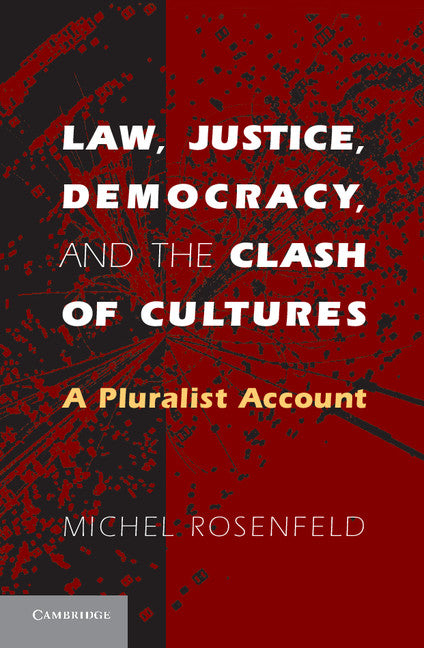Freshly Printed - allow 8 days lead
Couldn't load pickup availability
Law, Justice, Democracy, and the Clash of Cultures
A Pluralist Account
Argues that a political and legal philosophy based on pluralism confronts the problems of the twenty-first century.
Michel Rosenfeld (Author)
9780521878722, Cambridge University Press
Hardback, published 26 September 2011
320 pages
23.5 x 16.1 x 2.3 cm, 0.56 kg
"A masterful guide to the perplexing theoretical and practical issues confronting us.... Deeply anchored in classical and contemporary philosophical traditions, Rosenfeld offers the rich horizon of a comprehensive pluralism well attuned to the challenges of the contemporary world of globalism and cultural clashes..."
- Shlomo Avineri
Professor of Political Science, The Hebrew University of Jerusalem
The Cold War ideological battle with universal aspirations has given way to a clash of cultures as the world concurrently moves toward globalization of economies and communications and balkanization through a clash of ethnic and cultural identities. Traditional liberal theory has confronted daunting challenges in coping with these changes and with recent developments such as the spread of postmodern thought, religious fundamentalism and global terrorism. This book argues that a political and legal philosophy based on pluralism is best suited to confront the problems of the twenty-first century. Pointing out that monist theories such as liberalism have become inadequate and that relativism is dangerous, the book makes the case for pluralism from the standpoint of both theory and its applications. The book engages with thinkers, such as Spinoza, Kant, Hegel, Rawls, Berlin, Dworkin, Habermas and Derrida and with several subjects that are at the center of current controversies.
Part I. Liberal Justice and Fleeting Specters of Unity: 1. Reframing comprehensive pluralism: Hegel versus Rawls
2. Equality and the dialectic between identity and difference
3. Human rights and the clash between universalism and relativism: the case of minority group rights
Part II. E Pluribus Unum?: 4. Spinoza's dialectic and the paradoxes of tolerance: can unity be willed out of necessity?
5. The clash between deprivatized religion and relativized secularism: the constitutional conundrum
6. Dworkin and the one law principle: can unity be imposed through an interpretive turn?
Part III. Can Pluralism Thrive in Times of Stress? On Globalization, Terror and the Clash of Cultures: 7. Rethinking political rights in times of stress: can pluralism thwart the progression from stress to crisis?
8. Derrida's deconstructive ethics of difference confronts global terrorism: can democracy survive the autoimmune ravage of the terror within us?
9. Habermas's discourse ethics of identity and global terror: can cosmopolitanism, postnationalism, and dialogue downsize the terrorist threat?
10. Conclusion: the hopes of pluralism in a more unified and more fragmented world.
Subject Areas: Jurisprudence & general issues [LA], Law [L], Political structures: democracy [JPHV]


